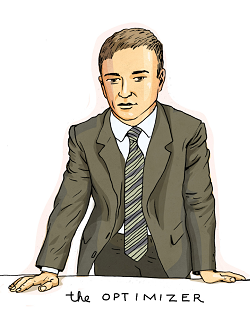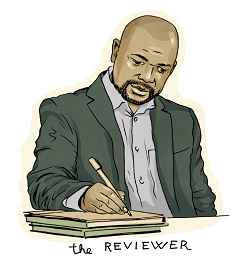How to understand personality psychology
Even if, as a financial professional, you’re a top salesperson, you’ll occasionally come across a prospective client with whom you just don’t seem to “click.” You deliver the same pitch that has worked for you dozens of times, and yet it may seem as if you are speaking a different language to them. So, you adjust your tactics—maybe ease up on the pressure a bit—to salvage the situation. But by this point, it just feels like you are on different planets.
You could chalk it up to a personality clash and move on to the next prospect. After all, nobody wins every time.
But if your pitch is falling flat more often than you’d like, the science of personality psychology could help you up your success rate. Sales divisions have long used personality testing to try to increase their numbers.
On the hiring side, for example, some contend that people who test as ESFPs on the ever-popular Myers Briggs Type Indicator make the perfect sales reps. Others say picking a variety of personality types identified through the Enneagram, which seems to be all the rage right now, is the best way to build a sales team.

The Collaborator
The peacemaker of every group they belong to, the Collaborator strives for cooperation. However, they tend to be sensitive to criticism and slow to make a decision.
Celebrity analog: Singer/songwriter Adele
Animal analog: Elephant, honey bee
Observed workshop behavior: Common personality type among groups of human resource professionals and home office staff members.
Tells: Soft eyes, slow and steady speech, non-threatening mannerisms.
How to pitch: Ask them about their feelings. Do not rush them for a decision.
When things get sticky: You’ll know it because they suddenly withdraw.
How to respond: Ask them about their feelings. Be a good listener. And then ask them about their feelings again.
On the selling side, personality psychology is often touted as a way to understand your clients and tailor your advice to their individual quirks. Jeannie Underwood-Kotner, head of Global Atlantic Consulting, says some financial professionals even ask clients to take a personality test at the beginning of their working relationship.
“The idea is that, if we’re going to be working together long-term, I need to know you better,” says Underwood-Kotner. “I need to understand your values and your motivations, in order to serve you better.”
Getting beyond your own personality type
The principles of personality psychology can also be used to more effectively interact with people even before they’ve signed on as a client. For example, the DISC Assessment, a favorite of author and motivational speaker Tony Robbins, determines which of four personality types you are, but also gives you tools to quickly size up someone else’s personality after just a few interactions.
Global Atlantic Practice Management Program Director Bill Sweeney says Global Atlantic prefers a similar assessment featured in its CORE Four workshop because it was developed specifically for financial professionals.
“Research tells us that most financial professionals sell more effectively to their own personality type,” says Sweeney. “The idea of CORE Four is that you don’t have to limit yourself that way. You can go beyond that to really grow your practice.”

The Optimizer
Bottom-line, get-it-done kind of people, Optimizers can also be insensitive to the feelings of others and impatient.
Celebrity analog: Actor Tom Cruise
Animal analog: Doberman
Observed workshop behavior: Complete their surveys first; fold arms waiting for other groups to finish.
Tells: Fast and punctuated speech, laser direct eye contact, smirk/uplifted chin (think: Maverick from Top Gun).
How to pitch: Ask them about their accomplishments. Show them the big picture.
When things get touchy: You’ll definitely know it, because an Optimizer—never one to shy away from conflict—will actually escalate the situation.
How to respond: Ask them about their accomplishments again (just kidding). Don’t get defensive. Ask for their input on how to resolve the conflict.
CORE Four workshop participants take only five-to-10 minutes to answer a 14-question survey. (By comparison, the Enneagram requires 105 answers, Myers Briggs, 90, and DISC, 25.) After doing a little bit of simple math, participants find out which of the four personality types they are—but at this point in the workshop they are only identified by the letters A, B, C, or D.
Participants are then separated into four groups based on their assigned letter and are presented with a tricky hypothetical work situation and asked how they would respond.
“Typically, there is near unanimity of responses within groups,” says Underwood-Kotner, which reinforces the legitimacy of the survey results.
That’s when participants get a wealth of info, not just about their own personality type, but about all four of them: Collaborators, Optimizers, Reviewers, and Energizers.
Looking for the ‘tells’
For each personality type, there are visual cues—demeanor, eye movement, vocal patterns—that can help you assess which personality type someone is soon after you meet them. “They are not unlike the ‘tells’ that a good poker player can use to read an opponent,” says Underwood-Kotner. With this info, you can determine the personality of clients and potential clients without having them take a test.
What’s more, participants learn the most effective approach for proactive engagement for each type—for example, pitching a new investment product. Then, they learn how to sense and neutralize conflict, also known as reactive engagement.
It is a lot of information, but it helps that CORE Four boils the personality types down to just four categories, as compared to Myers Briggs, which has 16, or Enneagram, which has nine. And each participant gets a hard copy of the CORE Four Overview Guide to go home with.

The Energizer
Dude! Free-thinking Energizers are amicable and creative, but they can be impulsive and over promise.
Celebrity analog: Comedian Will Ferrell
Animal analog: Golden retriever, maybe a Jack Russell terrier
Observed workshop behavior: Lots of fist bumping; the first group to form a circle, as if they are gathering around a firepit.
Tells: Animated, energetic, full vocal range.
How to pitch: Engage in a playful manner, keep it short but structured.
When things get touchy: You’ll know because they’ll deflect with a joke, and try to move on quickly, sometimes before the conflict has truly been resolved.
How to respond: Stay friendly! Ask for their thoughts and let them talk.
“It is worth taking the time to really understand what makes each personality type tick,” says Underwood-Kotner, “not just for the purpose of building your book of business, but to retain the business you have.”
For example, because financial professionals often have a disproportionate number of clients with the same personality type, it would not be unusual for, say, an Optimizer professional to have an Optimizer client. But because people often marry their opposite personality type, it would also not be unusual for that Optimizer client to have a Collaborator spouse. (Or for a Reviewer to have an Energizer spouse.)
When the Optimizer professional is working with a client couple, all might be well so long as most of their interaction is with the Optimizer half of the couple. But what if the Collaborator spouse loses her husband? The personality conflicts that arise due to personality conflicts might be the underlying reason why according to Boston Consulting, 70 percent of female widows fire their financial professional within one year of their spouse’s death. As the average age of a newly widowed female is 59.4 years, that means that the financial professional could be missing out on many years’ worth of business if the client walks.
“If you want to keep the business you have spent years building, you need to know how to adjust,” says Underwood-Kotner.

The Reviewer
These logical problem-solvers can also be overly rigid and judgmental.
Celebrity analog: Star Trek’s Mr. Spock
Animal analog: House cat
Observed workshop behavior: Most likely to want clarification on the specific meaning of survey questions; openly annoyed by Energizers.
Tells: Meticulous, rigid posture, precise and sometimes monotone vocal pattern.
How to pitch: Identify specific steps. Take notes when they are talking. Do not rush them for a decision.
When things get touchy: You’ll know because they will become (even more) passive aggressive.
How to respond: Don’t force a resolution. Ask them to explain their (exceedingly logical) logic.
Get started with the CORE Four workshop
To learn more about this workshop, complete this form. A Global Atlantic representative will email you the program materials and set up a time to discuss your needs. All programs are customizable and available online or in person.
Share
More on Practice Management
Your Thriving
Practice
A destination to empower financial professionals to build, manage, and grow their practice
Get started with Global Atlantic
Take the next step with a company that can help elevate your business.
Need help?
Find all the contact information to submit and service your business.










